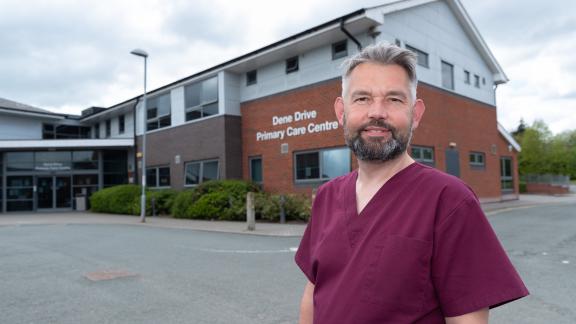Improving at the interface between primary and secondary care

Dr Jon Griffiths explains the work happening at the interface of primary and secondary care in Cheshire and Merseyside, to help streamline pathways for patients.
There is some crazy stuff going on at the interface between primary and secondary care. Not so long ago, at my GP practice, I had a consultation with one of my patients. They had recently had cervical spine (neck) surgery and wanted an extension of their fit note. On discharge from the hospital after the operation their surgeon had told them that they needed to take three months off work. They had then provided them with a fit note for two weeks. When my patient asked if they could not do a note for the full three months, they were told that their GP would have to provide this.
There are many other examples I could give to demonstrate the issues we are facing and consultant colleagues could easily provide similar frustrations of their own. Examples such as a consultant asking a GP to undertake an onward referral rather than doing this themselves; a GP failing to monitor blood pressure in a hypertensive who is awaiting an operative procedure; a hospital team failing to provide a fit note on discharge following surgery; a GP referring without following the locally agreed pathway; and a hospital team asking a GP to ‘chase results’ of investigations that they have arranged.
“Not only are we creating work unnecessarily, we are leaving the patient stuck in the middle”
All of the above has an impact and results in work being passed around the system, generating more doctor-initiated demand into an already stretched system. Not only are we creating work unnecessarily, we are leaving the patient stuck in the middle.
This feels like a problem that should be easy to solve. It is, however, a problem that has been years in the making and the solution requires myth-busting and behaviour change. These things are never easy. No one is trying to do a bad job, but there are barriers to doing the right thing including misconceptions around who should do what, and who is allowed to do what. Much of the work that needs to be done is around tackling this.
Quick wins
In Cheshire and Merseyside, we started looking seriously at this a few years ago during the COVID-19 pandemic. We were looking at our system pressures and conducted a survey of doctors to look for suggestions for ‘quick wins’. The results demonstrated that many issues would be solved with better interface working, including requests for clinicians to be accountable for their patients rather than passing to primary care; specialists making referrals themselves if they feel they are needed; and transparency in the way we work with each other across primary and secondary care. So, with this feedback in mind, we produced a consensus document describing behaviours that we would expect to see from colleagues across primary and secondary care, to help streamline pathways for patients.
We have subsequently produced a communications toolkit in response to medical directors’ requests for simple messages to disseminate to colleagues. Both of these documents are freely available on our website.
“…if we try to tell each other what to do, then success will be so much harder to come by than if we work together to co-produce”
One of the key learning points for us in all this is the importance of doing things collectively, with system partners engaged. Building relationships between colleagues is much needed and if we try to tell each other what to do, then success will be so much harder to come by than if we work together to co-produce.
Since we initially produced our consensus it seems that there has been increased national focus on the issue. The Academy of Medical Royal Colleges has produced a report, the Royal College of General Practitioners has published guidance, and NHS England has included ‘cutting burearocracy’ in its delivery plan for recovering access to primary care. This is all welcome work and I would encourage you to read the relevant documents.
Interface Improvement Programme
This year I have been fortunate enough to work on the Interface Improvement Programme, where teams from across England are working on specific projects related to the interface, supported by a quality improvement approach from the NHS Confederation. It is great to see these teams tackling issues such as consultant advice and guidance, consultant-to-consultant referrals, specific clinical pathway re-design and more.
I have hope that progress is being made. There is much work still to do, but systems are starting to engage and see this truly as a system problem and not just something GPs are moaning about. Our patients deserve more, and better. If we improve relationships and work together across the interface, we can deliver for them.
Jonathan Griffiths is a GP and associate medical director for primary care at NHS Cheshire and Merseyside ICB, and an external partner on the Interface Improvement Programme for Primary and Secondary Care. You can follow Jonathan on X @DrJonGriffiths



